The election of the Economic Freedom Fighter’s Bongane Cekiso may imperil the fragile peace in Coligny
There is a white woman who walks out of the front door of her almost-new RDP house every morning. Across the expanse of grass, here, on the edge of Coligny in North West province, she can see a new house that’s almost completed. There is a bond between these two houses, one that started with a 16-year-old boy lying in a sunflower field, his neck crooked at an unnatural angle.
It’s been a little more than a year since Matlhomola Moshoeu died here, allegedly killed by racist white security guards for stealing sunflower seeds. It would be the spark that laid bare long-standing racial tensions.
This week, Moshoeu family representative Stanley Mnyakama and Pastor Tiewie Pieter, on behalf of the farmer on whose land the incident took place, said that Moshoeu’s death had brought Coligny to the brink of a race war.
Matlhomola was allegedly killed when he was thrown off the back of a moving bakkie by Pieter Doorewaard and Phillip Schutte, two guards on the farm, who apprehended him for stealing sunflower seeds. The pair have pleaded not guilty to his murder and are due back in court in August. They claim that the teenager fell off the bakkie and broke his neck.
The arrest of the security guards ignited protests during their court appearances. Although the area’s black residents demanded the alleged killers be remanded in custody, about 50 white farmers and their families arrived at court brandishing firearms in support of the accused.
“We were brought back from that knife edge by the intervention of the churches and a collaboration with the ANC,” said the pastor this week.
In an attempt to address the deep-seated tensions in the area, he and the farming community in Coligny initiated the reconciliation project.
“We’ve included youth groups where people from town and the townships come together to talk about their problems. Farmers and the community together are cleaning up the township by getting tractors and front loaders for free. And we have a three-month project to do gardens and repaint old buildings. We hope to transform the town into a tourist attraction, because we are on the main road to Botswana,” Pieter said.
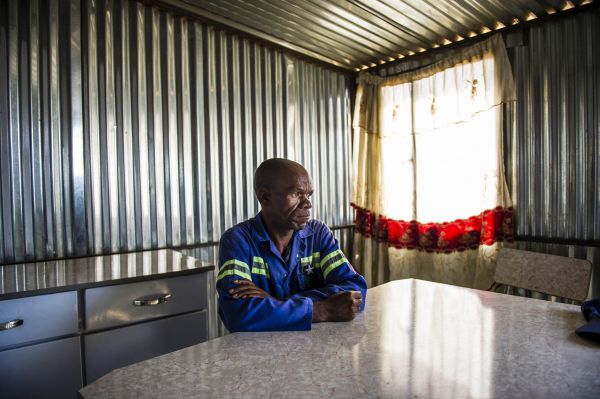
[Tale of three houses: Matlhomola Moshoeu’s father, Sakkie Dingake (above), says the family still lives in a rusting shack (below). (Delwyn Verasamy/M&G)]
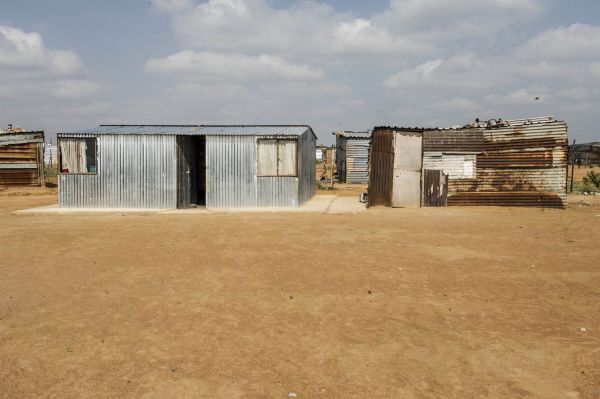
The owner of the cash-and-carry hardware store, Kobus van Tonder, is part of this project, and has reached out to residents of the Tlhabologang township’s Scotland section to offer help during the water shortages and fires they experience.
These gestures have not gone unnoticed, Mnyakama said.
“The relationship between black and white people is easing, even though there are incidents popping up. But one guy who convinced me that white people can change is that Kobus van Tonder. He loves the [Scotland section] community and cares about them. To an extent that the community itself goes down to him if they are faced with problems,” Mnyakama said.
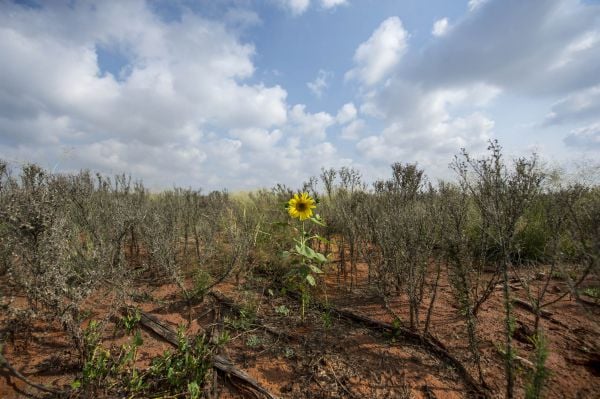
[A lone sunflower on the farm where Matlhomola Moshoeu died last year. (Delwyn Verasamy/M&G)]
But a “not guilty” verdict in Matlhomola’s case would likely reignite the simmering tensions, the Economic Freedom Fighters’ head of elections in North West, Israel Monaise, told the Mail & Guardian.
“If that can happen, Coligny will burn again. Our people are too angry over that case. That’s guaranteed.”
He said that attempts to foster reconciliation in the North West town should have happened before the boy’s death, and had come too late.
The EFF won a by-election in Coligny last week and the party has warned that “racist white people” should prepare to be exposed.
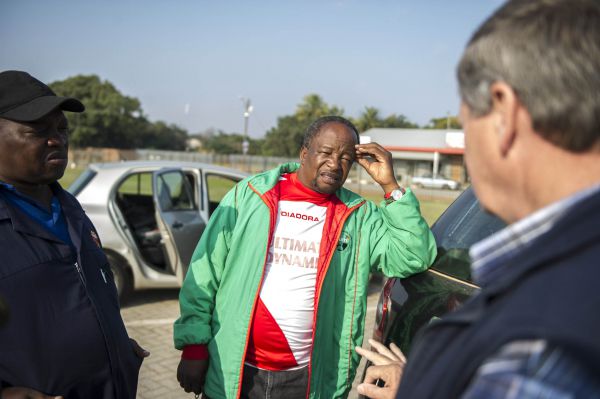
[The election of the Economic Freedom Fighter’s Bongane Cekiso may imperil the fragile peace in Coligny, says Pastor Tiewie Pieter, pictured below right with the Moshoeu family’s Stanley Mnyakama (centre). (Delwyn Verasamy/M&G)]
“They [the white community] are not genuine. They are saying it would have been better if ANC won the by-elections,” Monaise said.
“They said things are going to change here now because we are going to take our land back. They are afraid of that. We will take the land and expose their racist behaviour,” he added.
The EFF also claimed that the current attempts at reconciliation were a facade. “There are number of families here [in the township] which are still beaten by the whites where they are working. Police are even afraid to arrest white people who beat black people with guns. So their attitude has not changed at all,” incoming EFF councillor Bongane Cekiso said.
The EFF’s by-election victory over the ANC in the Ditsobotla municipality’s ward 15 — by a margin of 11 votes — shocked political parties in Coligny. Residents said it was partially a result of factional battles in the ANC as well as the Democratic Alliance’s vote being split by the Freedom Front Plus. The EFF received 699 votes, the ANC 688, the DA 374 and the FF+ 124.
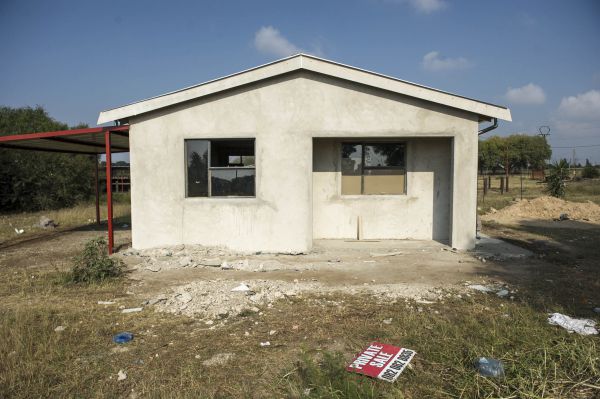
[An aid group is building the Moshoeu family an RDP house (above), but the family says the government led them to believe they would receive a larger structure in the township. (Delwyn Verasamy/M&G)]
ANC members blocked the main road to the Tlhabologang township before the polls as 16 people vied to become the party’s candidate for ward councillor. The FF+ campaigned for votes by claiming it was responsible for organising the farmers’ protest outside the court to defend the accused during the bail application in Matlhomola’s murder trial.
“Groups like FF+ and AfriForum were saying they brought that protection but they are so conservative. There are more and more farmers in Coligny that are voting DA and are much more liberal, and that’s a step in the direction we want to go,” DA councillor Clarence Algar said.
Algar said the EFF ward councillor’s election followed a divisive campaign and a meeting at which residents were allegedly offered free land. The EFF confirmed that the meeting took place and that residents were told to occupy land, but dismissed the claim that this was why they won the poll.
Algar said now that the red berets had taken power in Coligny, the white community was on edge. Pastor Pieter agreed, and claimed that the fear of land grabs had now been heightened.
“It’s bad with these guys in charge, hey. There’s a risk that they will undo our work, but we will continue,” Pieter said.
In Tlhabologang’s Scotland section, many residents speak of a simmering anger at promises left unfulfilled. Some of these accusations are directed at North West Premier Supra Mahumapelo.
A shiny new shack was built next to the Moshoeu family’s worn-out and rusted shack the day before the boy’s funeral, and Mahumapelo promised them further relief aid and a new house when he addressed mourners. A year later, none of the promises have been fulfilled and the family still lives in the shack that was built just before the funeral.
“The premier promised that he will definitely do something for the family and he will also come back to them to tell them what will happen to commemorate the death. Until so far, nobody came back,” Matlhomola’s father, Sakkie Dingake, said.
Instead, a new RDP house was built for a white family whose home was burned down during the protests that followed the teen’s death. Relief organisation Gift of the Givers has stepped in to build an RDP house for the Moshoeu family nearby.
Mahumapelo’s promise to give the bereaved family a house created an expectation that it would be better than an RDP unit, the family said this week, and would be located in the township. Instead, the nearly complete four-roomed structure built by Gift of the Givers is located on the outskirts of the business district.
Mnyakama this week berated the government for “abandoning” the Moshoeu family, pointing out that no government minister had visited the area since the alleged racist killing and saying there were no plans to develop the township with more formal housing.
“There is absolutely no development happening here,” he said, standing next to two water containers that service more than 3 000 people in the Scotland section.
“There is serious hunger, man. I’ve even been trying to get the mayor to contribute some groceries and make things easier, because there is unemployment here and Matlhomola’s brother and sister are still in school,” Mnyakama said.
In the sunflower field where the teenage boy died, a single sunflower stands among the weeds. The farmer who owns the field has refused to plant another crop, fearing it could be destroyed.
Now residents of the township’s Scotland section have called for his land to be expropriated without compensation for use by residents.
This week Matlhomola’s father, Dingake, appeared demotivated in the family’s shack, with its zinc doors and windows that have become rusted in the year since it was built, as he reflected on memories of his son.
Clutching his chin, he hunched over the worn-out kitchen table next to the broken fridge on the shack’s uneven concrete floor, coarsened by protruding gravel stones.
To illustrate his situation, he pointed to the only contents of the fridge: a piece of cabbage and an empty jar.
Dingake said he had not received any apology from the families of the men accused of murdering his son, and that no white people had come to see him to discuss the incident since it occurred.
“Their [the accused’s] parents could have come to ask forgiveness, to say this thing happened and, even though they don’t agree with what is said, for them to say forgive us for our sons being involved,” Dingake said.
“They never did that, and that’s shocking and surprising,” he added, explaining that the pain of losing his son has not waned, but only became stronger each time the murder trial resumed.